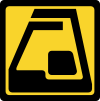Tehran Metro Line 1
Tehran Metro Line 1, coloured red on system maps runs north-south and is 36.6 kilometers (22.7 mi) of which 14.9 km (9.3 mi) is underground (from Tajrish station to Shush Station) and the rest at grade (at surface level). The number of stations along this line is 29 of which 22 stations are underground and 7 above. As of 2005, the line's total capacity is 650,000 passengers per day and trains make a scheduled stop of 20 seconds per station. The trains are made up of seven wagons, giving a nominal capacity of 1,300 seated and standing passengers. The maximum speed of the trains is 80 km/h (50 mph) per hour in practice tempered to an average 45 km/h (28 mph) due to station stops.
| Tehran Metro Line 1 | |
|---|---|
| Overview | |
| Native name | خط ۱ مترو تهران |
| Type | Rapid transit |
| System | Tehran Metro |
| Locale | Tehran, Tehran Province |
| Termini | Tajrish Station Kahrizak Station |
| Stations | 29+3 (Excluding IKA branch) |
| Operation | |
| Opened | 28 August 2001 (Initially)[1] 7 August 2017 (Most recent)[1] |
| Owner | Tehran Urban and Suburban Railways Organization (Metro) |
| Operator(s) | Tehran Urban and Suburban Railways Organization (Metro) |
| Depot(s) | Tehran-South Depot |
| Technical | |
| Line length | 36.6 km (22.7 mi) |
| Track gauge | 1,435 mm (4 ft 8 1⁄2 in) |
| Electrification | Third rail |
Tehran Metro Line 1 | ||||||||||||||||||||||||||||||||||||||||||||||||||||||||||||||||||||||||||||||||||||||||||||||||||||||||||||||||||||||||||||||||||||||||||||||||||||||||||||||||||||||||||||||||||||||||||||||||||||||||||||||||||||||||||||||||||||||||||||||||||||||||||||||||||||||||||||||||||||||||
|---|---|---|---|---|---|---|---|---|---|---|---|---|---|---|---|---|---|---|---|---|---|---|---|---|---|---|---|---|---|---|---|---|---|---|---|---|---|---|---|---|---|---|---|---|---|---|---|---|---|---|---|---|---|---|---|---|---|---|---|---|---|---|---|---|---|---|---|---|---|---|---|---|---|---|---|---|---|---|---|---|---|---|---|---|---|---|---|---|---|---|---|---|---|---|---|---|---|---|---|---|---|---|---|---|---|---|---|---|---|---|---|---|---|---|---|---|---|---|---|---|---|---|---|---|---|---|---|---|---|---|---|---|---|---|---|---|---|---|---|---|---|---|---|---|---|---|---|---|---|---|---|---|---|---|---|---|---|---|---|---|---|---|---|---|---|---|---|---|---|---|---|---|---|---|---|---|---|---|---|---|---|---|---|---|---|---|---|---|---|---|---|---|---|---|---|---|---|---|---|---|---|---|---|---|---|---|---|---|---|---|---|---|---|---|---|---|---|---|---|---|---|---|---|---|---|---|---|---|---|---|---|---|---|---|---|---|---|---|---|---|---|---|---|---|---|---|---|---|---|---|---|---|---|---|---|---|---|---|---|---|---|---|---|---|---|---|---|---|---|---|---|---|---|---|---|---|---|---|---|---|
| ||||||||||||||||||||||||||||||||||||||||||||||||||||||||||||||||||||||||||||||||||||||||||||||||||||||||||||||||||||||||||||||||||||||||||||||||||||||||||||||||||||||||||||||||||||||||||||||||||||||||||||||||||||||||||||||||||||||||||||||||||||||||||||||||||||||||||||||||||||||||
Line 1 runs mostly north-south, and the southern terminus has interchange platforms for its extension sometimes termed Metro Line 8, to Imam Khomeini International Airport completed in August 2017.[2] A 4.1 kilometers (2.5 mi), three-station extension of the line from Mirdamad station to Qolhak opened on May 20, 2009; a 4 kilometers (2.5 mi), four-stations second phase from Qolhak to Tajrish Square was completed in 2012.[3] Construction was to be completed by March 2007 but faced major issues due to large boulders and rock bed in part of the tunnels as well as water ingress/drainage issues. It also faced major financing issues as the government refused to release funds earmarked for the project to the municipality.
Route
The line starts at the northern terminus of Shari'ati Street, Tajrish neighbourhood and runs south along Shari'ati Street for about 5 km (3.1 mi). It runs briefly more westward along Mirdamad Boulevard. After passing through Mirdamad Station, it resumes its normal axis, reaching Beheshti Station where it intersects with Line 3. It mirrors the course of Dr. Mofatteh Street and after intersecting with Line 4 at Darvazeh Dowlat Station, on Sa'adi Street it rapidly intersects with Line 2 at Imam Khomeini Station at Toopkhaneh. It again shifts briefly southwest along Khayyam Street. Past Shush Station, the line surfaces and continues south, passing through Rey, and Behesht-e Zahra, Kahrizak, reaching Shahr-e Aftab Metro Station at Shahed - Bagher Shahr Metro Station.
Tehran Metro Line 8
Since 2017 the 50 km (31 mi) extension from further platforms at Shahed - Bagher Shahr Station via Shahr-e-Aftab Station heads to . It has been opened in August 2017.
References
- Schwandl, Robert (2010). "Asia - Iran - Tehran Metro". UrbanRail.net. Archived from the original on October 1, 2015. Retrieved January 17, 2011.
- Tehran metro line 8 ready.
- List of Tehran metro stations (Tehran Metro official website)
